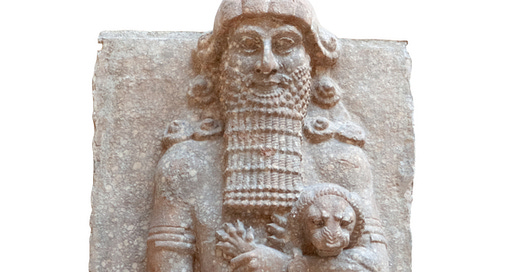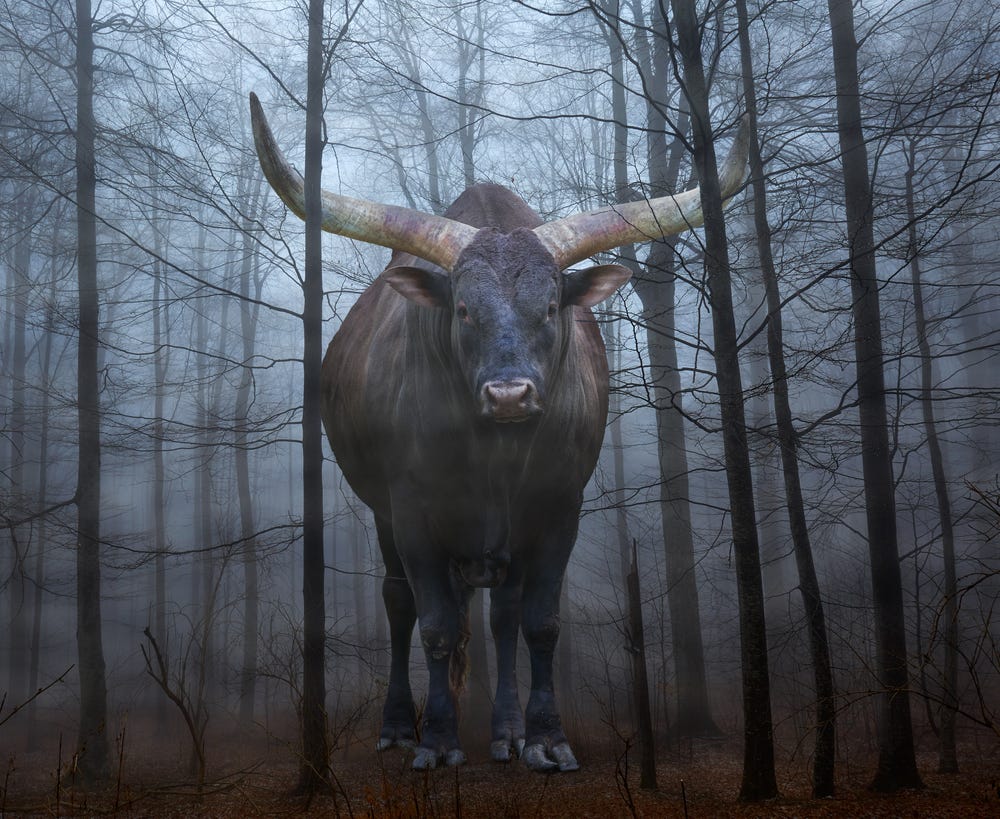Need an earlier part? Clicking the button takes you to a list of all episodes, with the first one at the bottom.
“The time has come to face Huwawa,” said Gilgamesh.
Much as Enkidu wished to adventure with his new-found brother, the idea of seeking battle with a giant such as Huwawa made him feel as if his heart were coated with ice. It took him a moment to gather enough breath to speak.
“He has been appointed by Enlil himself to guard the cedar forest. How can it be a good thing to fight him? Even if we win, will not the gods be angry with us?”
“Perhaps the gods placed him there precisely so that we would fight him,” said Gilgamesh, his voice betraying not even a hint of uncertainty. “Why else would they endow us with such strength, such bravery in combat?”
Enkidu shook his head. “You do not know as much about Huwawa as I do. Even when I lived among the beasts, I knew of him. It is said that the forest he guards is ten thousand leagues wide and ten thousand leagues long. So keen are his senses that he can hear a single needle drop anywhere within his domain. His voice roars like the Great Flood. He can spew fire from his mouth. He can breathe death upon us. If an army came to challenge him, every warrior would end up in the Underworld with the dark queen, Ereshkigal, where they would dwell among the shadows forever. All their hopes and dreams would be as dead as they were.”
“Ah, but that is my point!” said Gilgamesh, his voice sounding almost manic, at least to Enkidu’s ears. “No mortal can hope to ascend into the heavens and live with Utu and his divine kin. Death is an end for all of us, sooner or later. Our best hope—no, our only hope—is to win fame, so that our names will live forever. That is the only immortality a man can hope for. What better way to gain it than through defeating the undefeatable?”
Again Enkidu shook his head. “We are young. Other ways to gain fame may yet present themselves. As for this one, let it pass. It is not as if Huwawa pounds at the gates of Uruk, threatening your subjects. He is distant and will never trouble any of us. But if we draw near to him, he will certainly strike fear into our hearts, as he would with any mortal. Even the gods would not willingly go to war with such a mighty adversary.”
As if Enkidu had not spoken, Gilgamesh said, “I will climb the mountain and fell the greatest cedar tree. It will fall with such force that when it strikes the ground, it will make the earth shake and the wind blow. Only then can I assure myself of a place in the tales of my people from now until the end of time. But to reach that height, Huwawa must die.”
Yet again, Enkidu shook his head. “Felling a cedar tree is not essential to achieving fame. Your own father, Lugulbanda, did no such thing. Yet all the people of Uruk revere his name.” Enkidu didn’t add that Lugulbanda’s name was actually revered more than Gilgamesh’s—though the former beast man would have spoken the truth if he had made that comparison. Even Ninsun, had she been asked, would have been forced to agree. And she was a goddess who had seen the mortal Lugulbanda as fit to marry. What goddess had done the same for Gilgamesh?
“When you ran with the beasts, even the lions feared you,” said Gilgamesh. “How can you now hesitate? The best way to regain your strength is to remind yourself how fierce you truly are.” Gilgamesh extended a hand to Enkidu. “Come, my brother, for it is time to prepare for our journey.”
Enkidu knew in his heart that no good would come of this quest. But he lacked the will to question the decision a fifth time. He had no human family except for that of Gilgamesh, who had welcomed him without hesitation. He could not return to the animals now. The only path that didn’t lead to total isolation was with Gilgamesh.
Though Enkidu felt numb to anything but sorrow, he took Gilgamesh’s hand—his brother’s hand—and went with him to see the blacksmith.
Newly forged arms and armor pleased Gilgamesh. Forgetting his dream about Enkidu being the axe that fell from the heavens, he took instead his new axe and visualized how wonderful it would be to slice the head of Huwawa from his neck.
Enkidu, who, even as a beast, had killed only out of necessity and never as a way of glorifying himself, took the weapons and armor that he was offered. Afterward, though, he went secretly to the elders of Uruk, hoping that they could persuade Gilgamesh to relent. They had done nothing to restrain Gilgamesh during the dark early days of his reign, but Enkidu was desperate. He didn’t want to risk losing his brother’s trust—but better that than letting his brother die. Enkidu couldn’t escape the chilling feeling that the shadow of death had fallen upon him already.
Gilgamesh addressed the people of Uruk, who greeted his plan with wild applause—it would, after all, get him out of the city. He had not returned to his earlier habit of sleeping with all the brides, but why take chances?
However, once the applause died down, the elders raised their concerns. Gilgamesh, who recognized that their arguments were almost word-for-word the same as those of Enkidu, looked at his friend and laughed.
“Am I a coward, likely to run away from any danger? No! I am your king, and I go forth to do battle in your name. For if I am victorious, I will become even more formidable in the eyes of neighboring kingdoms. Who then will dare to make war on Uruk?”
The elders, who knew better than to push someone with Gilgamesh’s temper, wished him a safe journey. Enkidu thought about objecting again, but he knew better than to push Gilgamesh, either. His brother might be willing to laugh off Enkidu’s clandestine maneuvering, but public defiance might be more than the king would tolerate. Besides, it was clear he would go, no matter what anyone said.
At least if Enkidu went with him, the former beast man might give him some chance to survive the attempt. Enkidu did his best to cling to that thought.
Before leaving the city, Gilgamesh and Enkidu stopped at the temple where Ninsun dwelled to bid her goodbye. When she saw them, she perceived at once where they were going, and she would have attempted to dissuade Gilgamesh. In her heart, she agreed with Enkidu—the quest was far too dangerous. However, she knew that Gilgamesh, much as he supposedly valued her wisdom, would never listen to her if it meant turning away from what he truly desired. Instead of arguing, she asked them to wait for her blessing.
While she kept them waiting, she bathed herself, put on her finest clothing, and climbed the stairs to the roof of the temple, upon which the priests had long ago placed the altar of Utu, the sun god. There she burned incense and invoked the help of her radiant kinsman.
“Utu, I know this idea was somehow your doing,” Ninsun said, though she tried to keep her voice from being overtly accusatory. “Though you love Gilgamesh, you hate Huwawa even more. Only you could have put into my son’s head the foolish thought to challenge the guardian of the cedar forest.”
The sun continued to shine on Ninsun, though she thought she might have seen a sudden pinkness in the mid-day clouds, as if Utu had blushed at what he had done.
“Since you have ordained this quest, see to it that my son is safe. If need be, intervene with all your might. Blind Huwawa with a sandstorm. Lash him with a hurricane. Batter him with a deluge. Do whatever is needed to weaken his attack. And when Gilgamesh strikes, ensure that he strikes true and that the blow is lethal.”
Utu could have spoken to her but did not. She felt what might have been an answer in the way the wind caressed her cheek. That would have to suffice. Though Ninsun was the daughter of Anu himself, Utu far outranked her in the everyday operation of the world. She knew well the limits on how much she could demand.
Ninsun descended the stairs with a heavy heart, but she had one last move to make. After she blessed Gilgamesh and Enkidu, she took Enkidu aside for a moment.
“Though you were not born of my womb, you are my son as much as if I had birthed you,” she said, placing around his neck a jeweled pendant. “Watch your brother closely and keep him safe. For it may come to pass that he will not survive without you.”
Enkidu embraced her as he would have his own mother—if he had one. “With all my heart, I pledge to do as you have asked,” he said.
If a goddess was this worried, Enkidu knew his worst fears had been justified. But he couldn’t refuse her request. For better or worse, his fate was tied to Gilgamesh’s.

Gilgamesh and Enkidu reached the edge of the Mount Lebanon range in only three days, even though it was normally a seven-week journey. Their speed reflected Gilgamesh’s passion to do battle. But as they drew nearer to the cedar forest, Gilgamesh felt a tiny doubt nibble at his heart. What if Enkidu had been right?
Gilgamesh faced Utu as he set in the west, after which he and Enkidu dug a well from which to fill their waterskins. Then they climbed the mountain, and when they reached the top, Gilgamesh prayed.
“Spirit of the Mountain, send me a dream, that I may receive a favorable omen from Utu and know that my course is right.”
Enkidu tightened his hands into fists. If only Gilgamesh had been so concerned about divine guidance before, they might never have traveled to the cedar forest in the first place. But even now, Gilgamesh’s words sounded as if he was asking for confirmation more than guidance.
Still, Enkidu helped Gilgamesh build a primitive hut at the summit. They dedicated the hut to Sisig, son of Utu and god of dreams. Gilgamesh lay down on the rough ground, and Enkidu poured out enchanted flour to create a circle around Gilgamesh and allow him to dream. After completing the preparations, Enkidu left the hut. He lay at the threshold, guarding Gilgamesh as he dreamed.
And Gilgamesh did dream, but he awoke, trembling, his body covered in cold sweat. Unable to restrain himself, he stumbled to the threshold where Enkidu lay and awakened him.
“What happened?” asked Enkidu. “Did you dream?”
“I did,” said Gilgamesh, his voice shaky,” but it was more like a nightmare. I was walking in a valley beneath a mountain so tall that it seemed to touch the sky. Without warning, it fell on me. Though it didn’t crush me, I was trapped and couldn’t breathe. I felt Death coming for me. But then the sun broke through clouds and shined upon the mountain. What do you think this dream means?”
Enkidu heard the god of dreams whispering to him, telling him exactly what the dream meant. He opened his mouth to speak but then hesitated.
On its face, the dream was unclear. It could easily have meant that Utu would come to help Gilgamesh but arrive too late. All Enkidu had to do was interpret the dream that way, and his brother might be persuaded to return home.
But the god of dreams had insisted that the dream meant the exact opposite. Did Enkidu dare to ignore the words of a god? And even if he did, would that preserve Gilgamesh from harm? The former beast man had no way to know for sure. All he knew was that Gilgamesh trusted him. He could not lie to the person he loved most in the whole world.
“The dream shows you that, though you will be hard pressed by Huwawa, Utu will come and help you. In the end, you will prevail.”
Gilgamesh smiled, but the seed of doubt had taken root in his heart. Surely, the gods would not send him a false dream. But the nearer they got to Huwawa’s lair, the more Gilgamesh remembered how he felt in the dream. Why would an auspicious dream fill him with such terror?
As they travelled, Gilgamesh insisted that he try for to obtain a clearer dream four more times. Patiently, Enkidu helped him with the ritual four more times, stood guard four more times, interpreted four more times. The next three times, Utu appeared as a man and played a larger role. But each time, the menace Gilgamesh faced became more ominous. First, it was a man/mountain that grabbed him by the ankles and wouldn’t let him go. Next, it was a lightning storm that set fire all around him, followed by Anzu, the gigantic, fire-breathing bird. The fourth time, Utu did not appear at all, but a ferocious bull did. Gilgamesh faced it alone, and his terror was greater than ever before.
Each time, Enkidu longed to lie about what the god of dreams had told him. Each time, he told the truth instead. Whenever he did so, he felt as if he were ripping his own heart out of his chest, for he remained fearful of the undertaking, despite the dream god’s reassuring words.
If the gods intended to provide good omens, why did the dreams invariably frighten Gilgamesh, a man who wasn’t easily frightened in the first place? And why had the god of dreams told Enkidu that in the final dream, the bull represented Utu? Before, the sun god had always been represented by the sun or by a radiant and beautiful man. And if the bull was supposed to be Utu, why did he seem ready to attack?
Enkidu was no god himself, but he had been specially created by the gods, and he had been infused with the forces of nature, among other things. He was no ordinary man. In any other situation, he would have trusted his instincts, all of which told him that Gilgamesh should not make war on Humbaba. In any other situation, he would have interpreted at least some of Gilgamesh’s dreams as bad omens, not good ones.
The former beast man could not stop thinking about how fraught with peril their circumstances were. But defying the gods seemed even more perilous, so he held his tongue. He also kept a smile on his face, though he wept inwardly.
As for Gilgamesh, he could not stop worrying, either. The terror he felt in his dreams cast a long, cold shadow over his waking life. And he couldn’t help wondering why Enkidu, his new brother, didn’t appear in any of them.
Before long, they would learn a lesson that they would wish they had known earlier.
The gods might not lie—but they didn’t always tell the whole truth.
If you’re a mythology fan, you may be interested in my two novelizations of Greek mythology.
You may also be interested in my Menippus series, based on Greek mythology, right here on Substack.
Menippus and the Stranger
(This tale is inspired by a section in the Life of Apollonius by Philostratus.)









Nice cliff-hanger!
As someone living in modern-day Mesopotamia, I'm a sucker for anything ancient Mesopotamia. Gilgamesh is no exception. Fun fact, Mesopotamia translated into its native language Arabic literally means countries between two rivers. Thank you for sharing you Epic of Gilgamesh series, I look forward to whats next :)